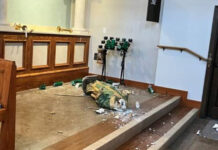What, for lack of a better world, we can call the theft by the Nicaraguan government of proprieties belonging to religious orders has continued recently with the appropriation of the Monastery of Saint Mary of Peace of the Trappist Nuns in San Pedro de Lóvago, Chontales. It has been appropriated by the government and allocated to the Instituto Nicaraguans de Tecnología Agropecuaria (INTA).
Unlike other religious orders, the Trappist nuns were not expelled but left Nicaragua voluntarily in February and relocated in Panama. They did so after they were told that their valuable property in San Pedro de Lóvago could be legally transferred to the Catholic Diocese of Juigalpa.
However, when the Bishop of Juigalpa, Marcial Guzmán Saballos, tried to take possession of the monastery, he was prevented to do so by the authorities, who told him that it had been confiscated by the government.

The confiscation of properties is one of several tools the Nicaraguan regime uses to harass the Catholic Church and other religious organizations, a persecution repeatedly denounced by Bitter Winter and described in detail in an August 2022 report by the United States Commission on International Religious Freedom (USCIRF), an independent, bipartisan U.S. federal government commission created by the 1998 International Religious Freedom Act (IRFA), whose Commissioners are appointed by the President and by Congressional leaders of both political parties.
In February, the Catholic Bishop of Matagalpa, Rolando José Álvarez, an outspoken critic of the regime, was sentenced to 26 years in jail, for “treason, undermining national integrity, and spreading false news.”

Pope Francis and Latin American Bishops denounced the sentencing of Álvarez as a blatant violation of religious liberty by a regime whose totalitarian nature should now be obvious to everybody. — Bitter Winter






